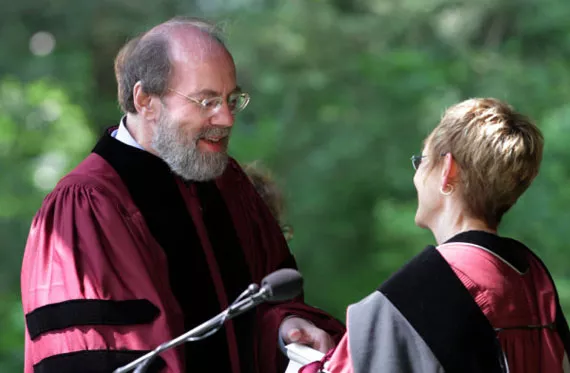President Chopp's Charge to Frank H. Easterbrook '70

Frank Easterbrook - world-renowned legal scholar, chief judge of the United States Court of Appeals for the Seventh Circuit, and senior lecturer at the University of Chicago Law School - your contributions to legal scholarship in the areas of corporate law, antitrust law, and the economic analysis of law make you one of the most-cited American legal scholars of all time, and your wise leadership of the seventh-circuit Court of Appeals has made you one of the nation's most influential and respected judges. The dean of the Chicago law school has said, "course after law school course has changed for the better as [your] judicial opinions have made their way into the curriculum."
You graduated from Swarthmore in 1970 with high honors in economics and political science, and then earned a J.D. cum laude from the University of Chicago Law School, winning there the Jerome N. Frank prize for the best student writing in the Chicago Law Review. You went on to the First Circuit Court of Appeals in 1973, serving as clerk for the Honorable Levin H. Campbell, then joined the U.S. Department of Justice, serving first as assistant to the solicitor general, the youngest in history, and then as deputy solicitor general, arguing more than 20 cases before the Supreme Court. In 1978, you became assistant professor at the University of Chicago Law School, full professor in 1981, and Lee and Brena Freeman Professor of Law in 1984. At the same time, you also served as a consultant to Lexecon, a leading consulting firm that pioneered the application of economics to legal and regulatory matters. In 1985, you were appointed Circuit Judge in the U.S. Court of Appeals for the Seventh District, the youngest federal appellate judge since 1892, and became its chief judge in 2006.
You have written more than 150 articles in legal and scholarly journals on legal topics as varied as antitrust law, intellectual property rights, corporate law, insider trading, price fixing, sentencing policy, judicial review, constitutional law, and presidential power. In 1981, you co-authored with Richard A. Posner Antitrust: Cases, Economic Notes and Other Materials, which has become the definitive text in law schools worldwide. The Economic Structure of Corporate Law that you co-authored with Daniel R. Fischel in 1991 not only brings the tools and perspectives of economic analysis to bear on issues of corporate law but also advocates legislative changes to promote social welfare. It was hailed in the University of Chicago Law Review as an extraordinary accomplishment "that has made a difference in our understanding of corporate law."
You have served as secretary-treasurer of the American Law and Economics Association, consultant editor of the European Journal of Law and Economics, and co-editor of the Journal of Law and Economics. You also serve as a member of several distinguished societies and institutions, including the American Law Institute, the American Academy of Arts and Sciences, and the Judicial Conference's Standing Committee on Rules of Practice and Procedure. Your many awards have included the Department of Justice Special Commendation for Outstanding Service, the Emory University Prize for Distinguished Scholarship in Law and Economics, and the Roth Lectureship at the University of Southern California.
Frank Easterbrook, you are a judge and judicial scholar of worldwide repute who has exercised singular influence on legal education; you are an expert on economic and corporate law and an accomplished leader of the Seventh Circuit Court of Appeals. Your meteoric rise in judicial circles has made you a perennial candidate for a seat on the U.S. Supreme Court. You are a model for those of our students who seek to combine knowledge of economics and law and serve as advocates for legislative change in order to promote social justice.
Upon the recommendation of the faculty and by the power vested in me by the Board of Managers of Swarthmore College and the Commonwealth of Pennsylvania, I have the honor to bestow upon you the degree of Doctor of Laws.



